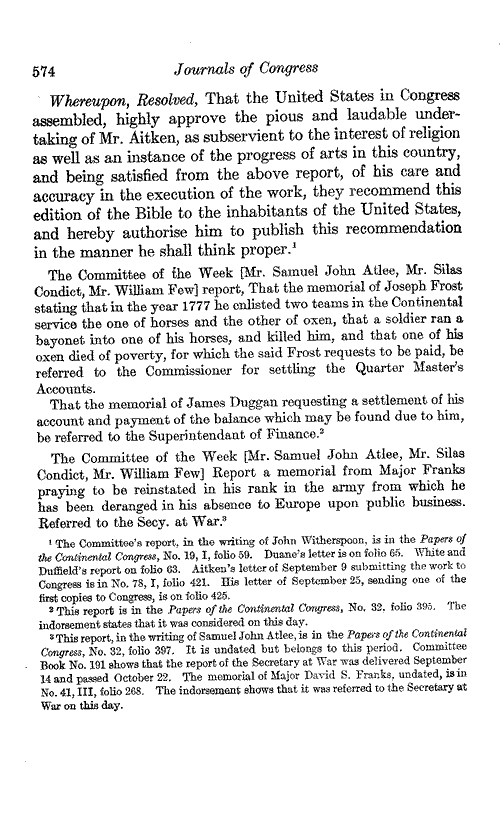Getting Jefferson Right co-author Michael Coulter and I went down to watch the Pittsburgh Pirates play the San Diego Padres a couple of nights ago. We should have known there would be a (100 minute or so) rain delay from this sky:

We were on the very top row which turned out to be an amazing view of Pittsburgh. Here’s one more:

PNC Park is a beautiful place to watch a game. In case you were wondering the Pirates won and swept the Padres at home for the first time in over a decade.
Month: July 2015
David Barton and Early Retirement: Actually Not a Bad Idea
David Barton is again claiming that living according to his understanding of the Bible will lead to a long life. This time the issue is retirement. He says since the Bible doesn’t talk about it, then Christians shouldn’t retire because it is a pagan concept. Watch:
[youtube]https://youtu.be/Fu_dNSvRLW4[/youtube]
He claims that Deuteronomy 6:24 promises good consequences to people who do what God wants us to do. So if there are negative consequences from some activity or practice (e.g., retirement) as demonstrated by science, then God must not want us to do it.
He then quotes unnamed actuaries as saying that people live 2.4 years past retirement on average. He says the statistics are there that show God did not design us for retirement.
Barton’s citation of 2.4 years is meaningless in absence of knowledge of the health status of the population involved or the average age of retirement in the population. Does this figure combine men and women? Blue-collar workers and people in professions? Furthermore, we don’t know how this figure compares to people who never retire. Misusing numbers, we could make Barton look pretty bad because those who never retire live zero years beyond retirement.
Studies of mortality and retirement are mixed, leaning in more recent work toward the finding that retirement has a beneficial effect on health and mortality. However, in some populations, people seem to have more trouble when they retire. I am going to look at two representative studies, one in favor of early retirement and the other demonstrating that retirement may lead to other problems which can shorten life.
The first study is titled “The Causal Effect of Retirement on Mortality: Evidence from Targeted Incentives to Retire Early” and was published in August 2013 (link). To help me understand the nuances of the study, I contacted co-author Jochem Zweerink at the University of Amsterdam. The study’s abstract says:
This paper identifies and estimates the impact of early retirement on the probability to die within five years, using administrative micro panel data covering the entire population of the Netherlands. Among the older workers we focus on, a group of civil servants became eligible for retirement earlier than expected during a short time window. This exogenous policy change is used to instrument the retirement choice in a model that explains the probability to die within five years. Exploiting the panel structure of our data, we allow for unobserved heterogeneity by way of individual fixed effects in modeling the retirement choice and the probability to die. We find for men that early retirement, induced by the temporary decrease in the age of eligibility for retirement benefits, decreased the probability to die within five years by 2.5 percentage points. This is a strong effect. We find that our results are robust to several specification changes.
In non-academic speak, Zweerink told me, “we indeed find that retirement has a beneficial effect on longevity.” He also told me that there is a positive effect on the spouse of men who retire early. Please note that this study included data on the entire population of the Netherlands.
On the flip side, there is a 2010 study by Andreas Kuhn and colleagues from the University of Zurich which finds some clues about why some studies might find negative consequences from retirement. This study’s abstract reads:
We estimate the causal effect of early retirement on mortality for blue-collar workers. To overcome the problem of negative health selection, we exploit an exogenous change in unemployment insurance rules in Austria that allowed workers in eligible regions to withdraw permanently from employment up to 3.5 years earlier than workers in non-eligible regions. For males, instrumental-variable estimates show that retiring one year earlier causes a significant 2.4 percentage points (about 13%) increase in the probability of dying before age 67. We do not find any adverse effect of early retirement on mortality for females. Our analysis of death causes suggests that male excess mortality is concentrated among three causes of deaths: (i) ischemic heart diseases (mostly heart attacks), (ii) diseases related to excessive alcohol consumption, and (iii) vehicle injuries. These causes account for 78 percent of the causal retirement effect (while accounting for only 24 percent of all deaths in the sample). About 32 percent of the causal retirement effect are directly attributable to smoking and excessive alcohol consumption.
This study examined the outcomes of early retirement on blue-collar workers in Austria. For these workers, retiring early is associated with earlier death for men but not women. Breaking the results down, it appears that early retirement gives some men more time to drink, smoke, eat bad food and get in car accidents (those all could be related). In other words, if you are thinking of retiring early so you can pursue an unhealthy lifestyle, then better to stay working. However, many other people retire because of pre-retirement health concerns and their demise can’t be blamed on retirement.
Reality isn’t as neat as David Barton’s poor exegesis of Deuteronomy 6:24. Those verses were given to Israel as a people and not you and me as individuals. And when one looks at all the data, the complexity is clear. For instance, in the Austrian study, women have different outcomes than men. Do the different outcomes mean that women can go against Barton’s interpretation of the Bible and do well, but men can’t?
Many studies show that retirement can be beneficial depending on what a person does. Many people retire from their job but don’t stop being active. They engage in more leisure if they have the means, but they often work part-time, or volunteer. I have been in churches where retirees carry on much of the work of the church because they have the time to do it. My plan is retire from teaching and then do something else. Maybe I’ll get a degree in history. I’ll surely have more time to debunk bad history if I am still interested in doing that then. If Barton never retires, then I will have no shortage of things to do.
Message to Glenn Beck and Fellowship Church: Congress Didn't Print the Aitken Bible
In addition to faulty theology, there are several glaring historical errors in Glenn Beck’s talk to Fellowship Church on July 5. Sadly, the audience is less knowledgeable now than before he spoke. Here is one example.
Glenn Beck told Fellowship Church that the first thing Congress did after the United States won the Revolutionary War was to print a Bible in English. Watch:
[youtube]http://youtu.be/cBgkSUILZEw[/youtube]
Transcript:
Don’t let anybody tell you we are not a Christian nation because we absolutely are a Christian nation. This is one of seven Bibles, three or four of them are held by the Smithsonian. Three are in private hands; extraordinarily rare. It’s called the Aitken Bible. This was the first thing Congress did when they started. We couldn’t print the Bible. So when we first established ourselves and we won the war, the first act was to print the Aitken Bible. When it was given to George Washington, he wept, and he said, ‘finally, a gift that is meaningful enough to give to the men that served by my side.’ We are a Christian nation. And we need to start behaving like a Christian nation, with love and respect, and take the beam out of our own eye before looking at the speck in someone’s else’s. We’re losing memberships in our churches because, stop talking about the things that the Bible tells us to do. Let’s start doing them!
It is ironic that Beck tells the audience to start doing what the Bible says just after he consistently bore false witness about the Aitken Bible.
Let me take Beck’s claims bit by bit.
It’s called the Aitken Bible. This was the first thing Congress did when they started. We couldn’t print the Bible. So when we first established ourselves and we won the war, the first act was to print the Aitken Bible.
Beck was holding up a copy of what appeared to be the Aitken Bible. It is rare and valuable. It is also true that the British prohibited Bibles printed in America. However, nothing he said after that is true. Congress did not print the Bible and the involvement with Aitken’s project was not initiated by Congress. Furthermore, the timing of Aitken’s request and Congressional response do not match Beck’s passionate claim. It most certainly is not the first thing Congress did after the United States won the war for independence.
Robert Aitken petitioned Congress in a letter dated January 21, 1781. He wanted the approval of Congress for a Bible he was printing and he wanted to be the official Bible printer of the United States. You can read his petition here and here. I have it below as well.
To the Honourable The Congress of the United States of America
The Memorial of Robert Aitken of the City of Philadelphia Printer
Humbly Sheweth
That in every well regulated Government in Christendom The Sacred Books of the Old and New Testament, commonly called the Holy Bible, are printed and published under the Authority of the Sovereign Powers, in order to prevent the fatal confusion that would arise, and the alarming Injuries the Christian Faith might suffer from the spurious and erroneous Editions of Divine Revelation. That your Memorialist has no doubt but this work is an Object worthy the attention of the Congress of the United States of America, who will not neglect spiritual security, while they are virtuously contending for temporal blessings.
Under this persuasion, your Memorialist begs leave to inform your Honours That he hath begun and made considerable progress in a neat Edition of the Holy Scriptures for the use of schools, But being cautious of suffering his copy of the Bible to Issue forth without the sanction of Congress, Humbly prays that your Honors would take this important matter into serious consideration & would be pleased to appoint one Member or Members of your Honourable Body to inspect his work so that the same may be published under the Authority of Congress. And further, your Memorialist prays, that he may be commissioned or otherwise appointed & Authorized to print and vend Editions of the Sacred Scriptures, in such manner and form as may best suit the wants and demands of the good people of these States, provided the same be in all things perfectly consonant to the Scriptures as heretofore Established and received amongst us, And as in Duty bound your Memorialist shall ever pray
Robt. Aitken Philadelphia. 21, Jany. 1781.
Aitken appeared to be under the impression that the United States might operate like Britain and regulate the authorized version of the Bible. He wanted his Bible to be the one approved by the government. In addition, he wanted Congressional awareness and approval because it had been illegal to do what he was doing under British rule. In fact, the war had not yet been won when Aitken began his work. He had already printed the New Testament but wanted to finish the job. “Being cautious of suffering his copy of the Bible to Issue forth without the sanction of Congress,” Aitken didn’t want to do anything which Congress might oppose.
Cornwallis surrendered to the American forces on October 19, 1781 so Aitken’s petition came prior to the end of the war, not first thing after we won. Congress appointed a committee to interact with Aitken as he progressed on his project. Aitken sent a copy of his Bible to Congress on September 9, 1782. The Congressional proclamation about the Bible was dated September 12, 1782. . The treaty of Paris formally ending the war did not come until September 3, 1783. The proclamation from Congress is below in the first paragraph:

There is nothing in this proclamation about Congress as Bible printer. Congress clearly recognized Aitken as the author and recommended his work for religious and artistic achievement. It was Aitken’s idea, his work, his investment, and eventually his loss. He didn’t make money on the project, and because Congress didn’t fund the project, he offered the Bibles to George Washington with the suggestion, made by a friend, that Washington ask Congress to purchase Bibles for the troops who had fought in the war.
Beck embellished the story more by involving Washington. Beck claimed:
When it was given to George Washington, he wept, and he said, ‘finally, a gift that is meaningful enough to give to the men that served by my side.’
There is no record that Washington wept when Aitken’s friend, John Rodgers, requested that Washington asked Congress to buy copies of the Bible for his troops. Washington declined politely saying that most of the troops had gone home and so he couldn’t make such a request. Washington’s return letter on the subject indicated that he would liked to have given the troops a Bible but not in the manner claimed by Beck. Here is what Washington replied to Aitken’s friend, Rev. Rodgers.
Your proposition concerning Mr. Aikin’s Bibles would have been particularly noted by me, had it been suggested in season, but the late Resolution of Congress for discharging part of the Army, taking off near two thirds of our numbers, it is now too late to make the attempt. It would have pleased me well, if Congress had been pleased to make such an important present to the brave fellows, who have done so much for the security of their Country’s rights and establishment.
Beck’s quote from Washington is quite a dramatic embellishment as is most of what he had to say to Fellowship Church. Beck’s story about Congress and the Aitken Bible is false; his citation about Washington is highly inflated and misleading. Most people listening would go away thinking that the first thing Congress did after winning the war for independence was to use public funds to print a Bible and give it to the American troops with the heartfelt approval of George Washington.
Beck’s key story used to support the claim that the U.S. is a Christian nation turns out to be a fabrication.
Beck has to know this. It has been pointed out publicly by numerous writers. Even if somehow he has avoided reading the many debunkings of this story, the alternative isn’t much better. He is either knows the story is a fiction or he is a very, very bad historian. Fellowship Church’s spokesman told Christian Post that Beck was “unmatched” in his knowledge of history. If that is so, then Beck misled Fellowship Church on July 5 with knowledge aforethought.
If Glenn Beck and Ed Young want to honor the passionate plea Beck made to Fellowship Church to stop talking about the things the Bible says to do and to start doing them, then they need to come clean to the congregation and set the facts straight.
For more on the Aitken Bible lie and the involvement of Washington, see this Huffington Post article by Chris Rodda.
Gospel for Asia Exhibiting at Calvary Chapel Pastors Conference; Any Answers There?
Earlier today, Danny Yohannan (K.P. Yohannan’s son and in leadership at Gospel for Asia) tweeted the following:
#ccspc15 Come by the Gospel for Asia table and get some awesome free materials. #veiloftears #books… https://t.co/rJWNoAf2WT
— Danny Yohannan (@DannyYohannan) July 6, 2015
GFA is exhibiting at the Calvary Chapel Senior Pastors Conference (watch live here). I wonder if GFA will address any of the CC pastors’ questions.
Tomorrow will be two months since GFA told me they would answer no more questions. GFA reps have time to exhibit at this conference but they can’t be bothered to address other matters such as:
- Why GFA leaders prevailed upon their own students to carry envelopes of undeclared U.S. cash to India in apparent violation of U.S. law. Thus far, GFA has not apologized for violating their own financial integrity guidelines or requiring students as young as 18 to engage in smurfing of large amounts of cash to India.
- GFA’s audit (conducted by Bland Garvey) failed to disclose three related NGOs which received funds from GFA’s American donors. Furthermore, between $30-50 million of money GFA said went to India in 2013 does not show up in reports submitted to the Indian government.
- Another question I hope someone from GFA will address is why there is a massive surplus of funds being stored in Indian banks.
- Perhaps leaders at the exhibit table could address why K.P. Yohannan claimed he didn’t allow men being ordained to kiss his ring but a video shows the men kissing his ring.
- An ongoing concern has been the stories of around 100 former staff members who have unresolved problems with GFA. Current turnover in U.S. staff should be a red flag to any supporter. Reports are now that few students are returning to the School of Discipleship for a second year.
- Maybe GFA reps could also say why GFA–India did not disclose to the Indian government the amount of money given to GFA–India by Canadian donors.
In addition to the “awesome free materials” perhaps Mr. Yohannan could give some free answers to these questions. If anyone attending the Calvary conference gets any responses, please add that information in the comments or send me an email.
Glenn Beck Tells Fellowship Church America is a Covenant Nation Like Israel
I told you Glenn Beck was going to teach theology at Fellowship Church and he wasted little time doing it. Watch (at about 4:00 into the full clip available on You Tube):
[youtube]https://youtu.be/MHXMZPgPxWs[/youtube]
Beck told the Baptists:
I have a lot of stuff and very little time. I wanna just kind of go through because its essential that we ask ourselves: who are we? Who are we? Because most people don’t know. And what keeps us going? Again, most people don’t know. We came here for a reason. We are a covenant nation. We are the only ones besides the original state of Israel that made the covenant with God.
The other day in response to Beck’s defense of Ed Young, I asked who is/was the American Moses. Beck says it was George Washington. Speaking of the first president, Beck said Washington was
Down on his knees after the first inaugural address, George Washington made a four hour covenant with the Lord. We are violating that covenant now. We are the ones that are blowing it.
Washington went to church for a service after the inauguration but I don’t think it lasted four hours.
 This is classic Latter Day Saint teaching about both history and theology. We’re not in the Bible but America is in the Book of Mormon which is where that teaching comes from.
This is classic Latter Day Saint teaching about both history and theology. We’re not in the Bible but America is in the Book of Mormon which is where that teaching comes from.
A couple of years ago, I noted that David Barton had endorsed a book which included this covenant teaching. Beck featured Tim Ballard on his show and raved about the book. Here is what Mormon Tim Ballard says about America as covenant nation.
One of our preeminent examples of one who possessed such innate conviction was George Washington. He declared the following in his first inaugural address as the first president of the United States. His message not only reflects his own understanding of the American Covenant, but that of those who came before him in discovering, settling, and founding the new nation.
[I]t would be peculiarly improper to omit in this first official Act, my fervent supplications to that Almighty Being who rules over the Universe, who presides in the Councils of Nations, and whose providential aids can supply every human defect, that his benediction may consecrate to the liberties and happiness of the people of the United States.
Ballard, Timothy (2012-05-16). The Covenant: America’s Sacred and Immutable Connection to Ancient Israel (Kindle Locations 1074-1080). Legends Library. Kindle Edition.
Ballard doesn’t write about a four hour covenant but he adds:
Can there be any doubt that Washington possessed an understanding of the American Covenant and of his associated obligations to the people and to God? As he accepted the presidency, it seems as though he felt the weight of his responsibility within the context of that relationship.
Moments before this address, Washington was sworn in as the first president of the United States. This “swearing in” ceremony makes the inaugural address even more significant, as it truly portrays our first president in his role as American Covenant-maker. For example, consider the words of the oath of office, which are found in Article II, Section I of the Constitution of the United States: “I do solemnly swear that I will faithfully execute the office of the President of the United States, and will to the best of my ability, preserve, protect, and defend the Constitution of the United States.”
The profundity of that promise is revealed as we examine the true nature of the Constitution as national scripture. The Constitution (as will be detailed later) does nothing less than prescribe the formula for securing those American Covenant blessings of liberty, protection, and prosperity. It is but the modern political version of the ancient promise to Joseph found in Genesis 49. In swearing to uphold the Constitution, each president is committing himself and the nation to God and the American Covenant.
Ballard, Timothy (2012-05-16). The Covenant: America’s Sacred and Immutable Connection to Ancient Israel (Kindle Locations 1089-1100). Legends Library. Kindle Edition.
Ballard believes that American colonists were Ephraimites and have a connection to Israel. Mormons have an extremely high regard for the Constitution and consider it divine.
Blogger P.J. Miller calls this heresy and explains it is also popular at the American Family Association. My good friends over at Christ and Pop Culture discuss the broader manifestation of Americanism and address the false teaching that it is.